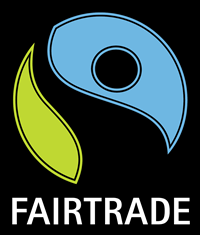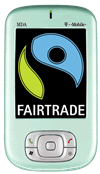Practical Responses
Fair Trade
 When you buy a chocolate bar, in the UK, chances are that key ingredients, such as the cocoa, were produced by slaves. The coffee we drink may have been made from beans picked by children. A lot of the workers who make our clothes, footballs etc. may be exploited, working in poor conditions with no healthcare, no job security etc.
When you buy a chocolate bar, in the UK, chances are that key ingredients, such as the cocoa, were produced by slaves. The coffee we drink may have been made from beans picked by children. A lot of the workers who make our clothes, footballs etc. may be exploited, working in poor conditions with no healthcare, no job security etc.
The Fair Trade mark appears on more than 850 varieties of coffee, tea, cocoa, chocolate, sugar, honey, snacks, cakes, biscuits, fresh fruit, and juices. Fairtrade foods are available in most major supermarkets, independent shops, whole food, Fair Trade shops, and from Oxfam and Traidcraft.
Awareness of Fairtrade is growing, with more than a third of the UK population now recognising the FAIRTRADE mark. In the two years since 2001, overall sales of Fairtrade certified products grew in the UK by 83%. In 2004 the estimated retail value of sales of Fairtrade certified products was over £140 million.
The Fair Trade logo is a labelling system that gives us peace of mind about what we buy.
- The producers will have been given a fair price
- Production will be sustainable and environmentally sound
- Working conditions will meet strict standards
- Producers are investing in the local community
- Rigid health and safety standards are enforced
- Contracts will be secure and long-term
- New oppoetunities will be available for women
- Workers will have more control, by being members of democratic organisations
Ethical consumerism
Many Christians feel uncomfortable living in the modern "consumerist" world that puts money and profit before people. Augustine wrote that business itself was evil. He believed that, while it was fine to make and sell goods, it was wrong to be in the business of merely buying and selling. In the 21st Century, with 6 billion people in the world, consumerism is a reality. However, there are many principles that can help people to spend their money more ethically. For example, it is much better to do your weekly shop at a Farm shop which sells local produce, than to go to a supermarket that brings food from all over the world. The local producer will get more money from the farm shop, and less damage will have been done to the environment if the food hasn't travelled far.
What is ethical purchasing?
Positive buying is favouring ethical products, be they fair trade, organic or cruelty free. This option is arguably the most important since it directly supports progressive companies.
Negative purchasing means avoiding products you disapprove of such as battery eggs or polluting cars.
Company-based purchasing involves targeting a business as a whole. For example, the Nestlé boycott targets all its brands and subsidiaries in a bid to force the company to change its marketing of baby milk formula in the Third World.
The fully screened approach is a combination of all three and means looking at all the companies and products together and evaluating which brand is the most ethical.
How to buy ethically
- Buy from local shops and health food shops
- Buy products labelled "Fair trade"
- Avoid products not tested on animals
- Buy vegan and vegetarian products
- Buy organic produce
- Buy Non-genetically altered food
- Ethical money - choose your bank and investment products carefully
- Get involved in Recycling
- Buy second hand products when possible
- Try to buy Wood Products and look for the FSC logo
Things to avoid
Christians try not buy from companies that:
- make or use gambling equipment
- produce firearms
- create alcohol or tobacco
- operate nuclear power stations
- sell military weapons
- experiment on animals
- pollute the environment
- produce pornography
- have a bad human rights record
- have poor employment records
- work with oppressive regimes
- support GM foods, embryology, abortion etc
JustShare is a coalition of churches and development agencies committed to global economic justice.
Today, JustShare seeks to:
- Understand the impact of the financial sector on global poverty
- Raise awareness within the City of London of global economic injustice
- Engage in dialogue with key City of London institutions on these issues
- Encourage changes in policy and practice to bring about a more just world
JustShare does this by:
- Hosting public lunch-hour debates on questions such as 'Is Fairtrade Really Fair?' or 'Shrinking the City's Global Carbon Footprint,' and inviting City workers, Christians, campaigners and other interested parties to attend
- Engaging in dialogue with banks and financial institutions in the City
- Equipping and encouraging Christians to promote justice as an integral part of their faith
- Promoting Fairtrade
- Running training seminars on finance and economics-related topics
- Holding a major event on May Day in the heart of the City
